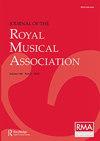Conducting Problems and Graphic Issues as Reasons for Revising a Composition
IF 0.5
2区 艺术学
0 MUSIC
引用次数: 0
Abstract
similarly self-fashioned authorial subjects, now becomes harder to extricate from the empirical subject (‘the real person’), as a forest of links and hyperlinks causes the mingling of that selfconsciously crafted creative persona with news and reportage. Thematerialist deconstruction of art’s ‘transcendence’ comes home to roost, and Henze’s holde Kunst becomes just another branch of current affairs, its expansive temporality now forced to coexist with (and pressurized to conform to) the rapid cycles of media consumption. With the dignified distance between work and non-work increasingly effaced, the former becomes gathered up in the ceaseless flow of the composer’s ‘production’ – and indeed of ‘production’ generally, as sidebars encourage the effortless surfing from one work and one composer to another. At one level, nothing could seem more fitting for Henze’s Gesamtkunstwerk-in-progress, in which musical others – the composers he arranged, the arrangers who arranged him, or those (Hindemith, Stravinsky,Mahler, Berg)whoprovide themusic’s undercurrent of stylistic allusion– coexist in a single stream. Yet even today composers work in a system (of royalties and copyright inter alia) to which traditional notions of authorship remain fundamental and the composer’s exercise of control over correctness or incorrectness (even on a level as mundane as proof correction) is not just a right but a duty. Where authorized meanings are concerned, these are less easily reined in by trilingual commentaries in a work catalogue – commentaries which, quite rightly, should provide the beginning rather than the end point of critical interpretation. But the algorithms of the internet do not interpret; they simply expose. Search rankings throwup repetitive gobbets of information, reducing meaning to (often literally) anonymous soundbites. As Groys suggests, the ‘gaze of others’ under which the internet places us ‘is experienced by us as an evil eye’ not because it is all-seeing – it isn’t, quite – but because it ‘reduces us to what it sees and registers’.90 Henze’s attempt to ensure the longevity of his output by making of it a cloth-bound physical memorial may, from this vantage point, seem an antiquated and somewhat futile gesture, a mode of authorial control exercised in its very death throes. And yet perhaps he was prescient too in realizing that such longevity may depend on his works’ ability to forget their origins from time to time and forge new paths into the future: a future not of instantaneous transparency but of ongoing hermeneutic endeavour, the constant creation and recreation of meaning; a future not left to the inertia of impersonal repositories of information, but shaped humanly, intentionally, subjectively, as a willed ‘compositional’ and communicative act.作为修改作文理由的传导问题和图形问题
类似于自我塑造的作者主体,现在变得更难从经验主体(“真实的人”)中解脱出来,因为链接和超链接的森林导致了这种自我塑造的创造性人物与新闻和报告文学的混合。对艺术“超越性”的材料主义解构回到了原点,亨泽的《昆斯特》只是时事的另一个分支,其广阔的时间性现在被迫与媒体消费的快速循环共存(并被迫顺应)。随着作品和非作品之间的庄严距离越来越消失,前者聚集在作曲家的“作品”——实际上是“作品”的不断流动中,因为侧边栏鼓励从一个作品和一个作曲家毫不费力地浏览到另一个作品。在某种程度上,似乎没有什么比这更适合亨泽正在进行的《Gesamtkunstwerk》了,在这部作品中,音乐上的其他人——他安排的作曲家、安排他的编曲人,或者那些提供音乐风格暗示暗流的人(Hindemith、Stravinsky、Mahler、Berg)——共存于一股洪流中。然而,即使在今天,作曲家也在一个(版税和版权等)体系中工作,在这个体系中,传统的作者概念仍然是基本的,作曲家对正确性或不正确性的控制(即使是在证明更正这样平凡的层面上)不仅是一种权利,也是一种义务。就授权含义而言,作品目录中的三语评注不太容易控制这些含义——评注应该提供批判性解释的起点而不是终点,这是非常正确的。但互联网的算法无法解释;它们只是暴露。搜索排名充斥着重复的信息,将意义(通常是字面意思)简化为匿名的声音片段。正如Groys所说,互联网将我们置于“他人的凝视”之下,“我们将其视为一只邪恶的眼睛”,这并不是因为它能看到一切——事实并非如此——而是因为它“将我们简化为它所看到和记录的东西”,这似乎是一种过时的、有些徒劳的姿态,一种在垂死挣扎中行使的作者控制模式。然而,也许他也有先见之明,意识到这样的长寿可能取决于他的作品是否有能力不时忘记它们的起源,并开辟通往未来的新道路:一个不是即时透明的未来,而是持续的解释学努力,不断创造和再创造意义的未来;未来不是由非个人信息库的惰性决定的,而是由人的、有意的、主观的、有意愿的“组合”和交流行为塑造的。
本文章由计算机程序翻译,如有差异,请以英文原文为准。
求助全文
约1分钟内获得全文
求助全文
来源期刊
CiteScore
0.50
自引率
0.00%
发文量
16
期刊介绍:
The Journal of the Royal Musical Association was established in 1986 (replacing the Association"s Proceedings) and is now one of the major international refereed journals in its field. Its editorial policy is to publish outstanding articles in fields ranging from historical and critical musicology to theory and analysis, ethnomusicology, and popular music studies. The journal works to disseminate knowledge across the discipline and communicate specialist perspectives to a broad readership, while maintaining the highest scholarly standards.

 求助内容:
求助内容: 应助结果提醒方式:
应助结果提醒方式:


